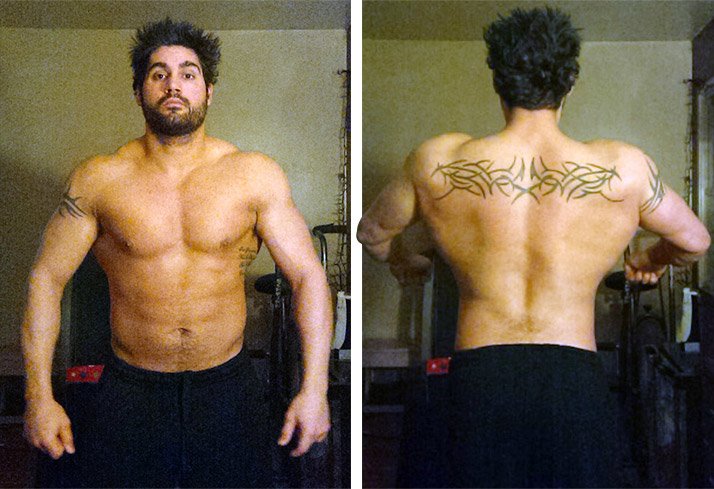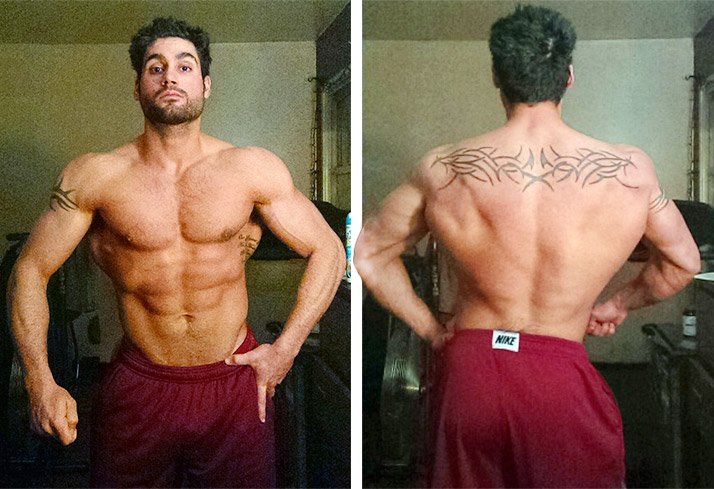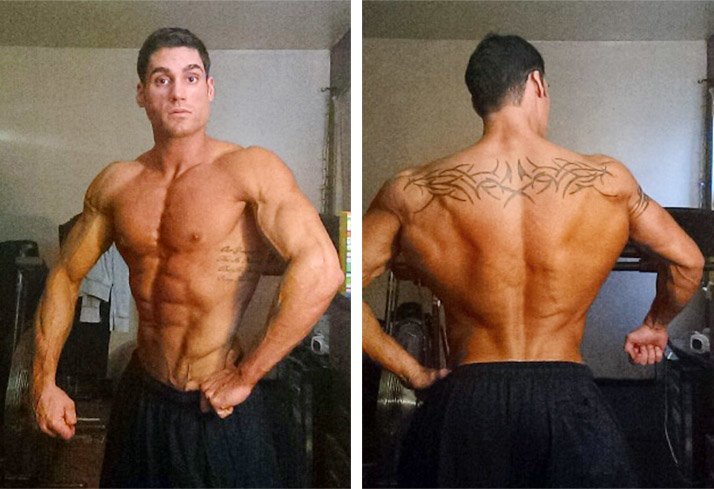
8 Secrets Of Successful Contest Prep!
Think you're ready to prep for a bodybuilding contest? Don't do anything until you read these 8 tips from men's physique competitor and Grenade athlete Vincent Russo!
As a physique competitor, I enjoy the science and experimentation behind prep nutrition, and the way months of hard work boil down to one amazing day in front of the judges. I learn something every time I compete, so I'm constantly progressing—and my efforts are consistently rewarded. I love the sport, the competitors—and the post-show meal!
If you're toying with the idea of doing a competition, I encourage you educate yourself and go for it! Yes, it's going to take you 3-4 months of strict dieting and hard training, but there's no better feeling than seeing the results of your sacrifice and hard work! You have control over your body, and a competition is one of the most dramatic ways to physically see this.
To help you, I've put together a list of eight must-read contest prep tidbits. Follow these tips, and you'll be well-prepared for your show. Even if the results don't turn out the way you expect them to, you'll be happy and proud with the knowledge that you gave it your absolute all.
1Don't change too much too soon
Throughout your competition preparation, you'll have a lot to think about. Each week, depending on your progress, you may have to manipulate your macronutrients, cardio, certain exercises, rest time between sets, and a host of other variables.

When this happens, do notmanipulate too many variables at once. I say this because if you change too many things at the same time, you won't be able to pinpoint what's working and what isn't. For example, if you feel like you should be seeing more progress than you are, you may decide to cut some carbs and add some cardio. These are fine changes, but make sure you do one at a time!
You may learn that adding 20 minutes of cardio three times per week is just enough to reboot your fat loss. Cutting carbs may not be necessary, at least during this stage of your prep; save that for later. To ensure you have a lot of weapons in your fat-loss arsenal throughout the entire prep period, always consider the "minimum effective dose" and change one little thing at a time.
2Be cardio-smart
You need to do cardio—that's just a fact of prep life—but you need to make sure you do it right. Start with a minimal amount of cardio and work your way up. (Remember the "minimum effective dose" discussed above?) I say this because cardio is a stressor that your body will naturally adapt to. If you start off with a limited amount and add short increments here and there, your body will adjust to them one at a time, allowing you to consistently make progress.
Programming your cardio this way will help you burn fat more efficiently. If you start off with an hour of cardio, your body will adapt to that stress, which means you'll just have to add in more and more time on the treadmill (or go crazy with demanding interval sessions, which can be even more exhausting). Depending on how long your prep is, you may find yourself doing two or more hours of cardio just to get the same effect you once got with one hour! That just plain sucks.
I like to start off with 15-20 minutes after my workouts and add 5-10 minutes every time I need to up the cardio variable.
3Carbohydrates are your best friend
I know this may seem counterintuitive, but trust me: If you use carbs the right way, you can keep them in your contest-prep diet.
The only hard-and-fast rule I have about carbohydrates is that I don't eat any processed carbs like Pop-Tarts and other junk you may see Internet fitness enthusiasts eating. I don't like that junk during contest prep. If it comes in a package, I don't eat it.
During the off-season, I eat a lot of carbs. That way, my body gets accustomed to using them, and I don't have to cut them so low during my prep. When I do end up cutting carbs at the end of my prep, I can still eat enough that I don't feel like a zombie. Feeling good during my preparation makes a huge difference in my mindset and energy levels.
Carbohydrates also have a muscle-sparing effect, which means that your muscles can use them for energy instead of using protein. And because carbs signal an insulin release, they can help hinder stress hormones like cortisol. Cortisol can have catabolic effects, which is no good if you want to maintain as much muscle mass as you can during a long deficit.
4Experiment
Everyone is different, which means there are no cookie-cutter prep programs that work for every single competitor. Your genetic make-up, the hormones in your body, any deficiencies, how active you are, and a number of other personal variables will influence what happens to your body as you diet. Some people need to eat a shocking number of calories just to maintain size, and others need to almost completely cut carbohydrates in order to reach their desired physique.
Your first contest preparation may actually be a big game of trial and error. That's OK. Give yourself some extra preparation time and remember, once again, to change each variable one at a time. Once you figure out how your body responds to that first preparation period, you'll learn what works best and figure out how to make the most progress each and every time.
5Record, record, record
How do you figure out what works for you? Write down everything! Recording what you eat, what you crave, how you train, and how you feel will help you figure out what's working and what's not. Be absolutely sure to record each and every variable you change and how dramatically you change them.
Dropping your rest periods? Write it down. Increasing your cardio? Write it down. Cutting 150 calories from your diet? Write it down! And then, of course, follow up and write down the effects. Did dropping calories spur you to lose one pound during the week? That's a successful change, and that's the info you need to track.

Get a notebook or use BodySpace and an app like MyFitnessPal to track your workouts and your meals. Keeping track of your progress will help you develop good habits. You'll be more efficient, more organized, and ready to plan your next step. Yes, it will take a little extra time out of your day, but the benefits are well worth it.
6Be consistent
During prep, there will be ups and downs. Some days will be harder than others, and many outside influences can affect your preparation. Keep your goal in mind, visualize it on a daily basis, and stick to the plan! If you're doing everything right, it will all come together.
Try not to let anything or anyone knock you off track. If you get sick or binge way beyond what you intended, don't quit! Take one day at a time—or even one meal at a time—and get right back on the horse. Life is unpredictable in many ways, but if you are prepared, then you'll always have a fighting chance.
Most importantly, don't give up on yourself or slip into a negative headspace if you cheat on your diet or miss a workout. Stay positive and get back on course as soon as possible. This will ensure one cheat doesn't turn into a negative spiral of cheats.
7Get a prep coach
I understand that hiring a coach may be a cost not everyone can afford, but I can't stress enough how nice it is to have someone keeping an eye on you. I use a coach during contest prep to help me stay on track.
A good prep coach can be hard to find. First, he or she needs to be honest. You want someone who can look you in the face and say, "It's time to get your shit together because we are three weeks out and you look about six weeks out." You don't want someone to lie and say you look great when you're not progressing the way you should be.

You also need to find a person who knows what she is doing. A good reputation is always beneficial, so ask around at your gym or online. When you find a suitable candidate, schedule an interview to see what he or she knows. Ask for examples of prior prep plans, progress photos of previous clients, sample workouts, and similar pieces of evidence.
If your coach has you doing something like two hours of cardio on a 1,300 calorie diet with 50 grams of carbs per day, get rid of him. A good coach needs to have a sound understanding of how the body works and the hormones involved in your bodily processes. A "more is better" attitude is only going to make your prep a terrible experience. This is one case where "smarter" often outweighs "harder."
8Attitude is everything
When the time comes, if your competition placement doesn't turn out exactly like you wanted, don't beat yourself up. You're still a winner! If you gave that competition your all and can confidently tell yourself that you did your best, then you won hard-earned experience, important knowledge for your next show, and much more.
If you did your best during your prep, you'll look the best you've ever looked when you step on stage. Now, if that's not good enough for the judges, so be it. But that's not the only thing that matters. Be happy with your hard work, dedication, and the package you were able to bring to that stage. That's a win in my book!
